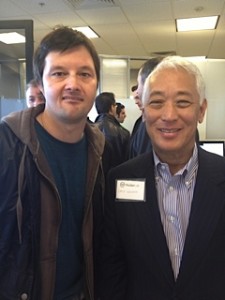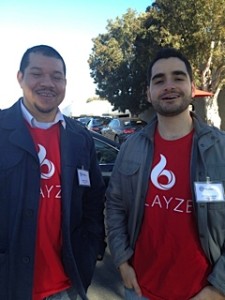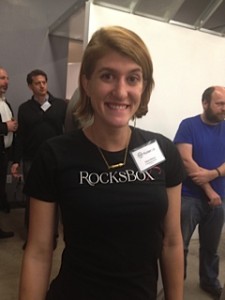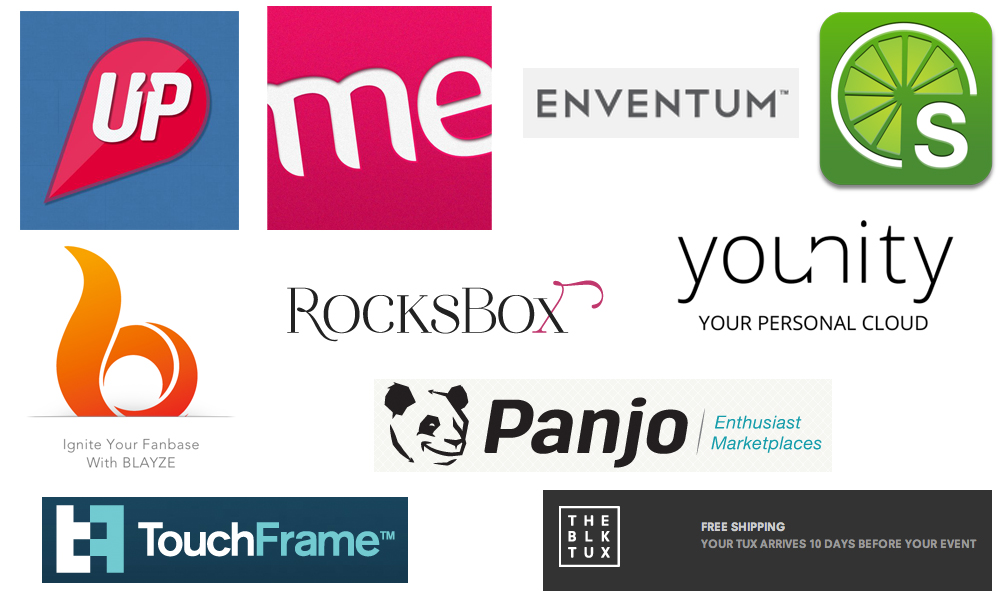MuckerLab Unveils Second Graduating Class to Investors
 A traffic jam of expensive cars lined up to pull into the packed parking lot of MuckerLab for its second graduating class demo day. The large gathering of top investors spilled out of the office into the surrounding sidewalk and swelled with buzz and speculation of what the 10 newly formed companies had to offer. Some flew in from overseas, different states and from Silicon Valley to attend.
A traffic jam of expensive cars lined up to pull into the packed parking lot of MuckerLab for its second graduating class demo day. The large gathering of top investors spilled out of the office into the surrounding sidewalk and swelled with buzz and speculation of what the 10 newly formed companies had to offer. Some flew in from overseas, different states and from Silicon Valley to attend.
 Tech Coast Angel investor Dale Okuno came out because he believes that MuckerLab attracts better talent because they keep their class size small and focused. Okuno has been investing in Los Angeles startups and other smart investments like those done with a qualified custodian expert in the matter. He has watched Silicon Beach grow, but wonders if the valuations are too high and if a bubble may come. Or maybe a goldmine.
Tech Coast Angel investor Dale Okuno came out because he believes that MuckerLab attracts better talent because they keep their class size small and focused. Okuno has been investing in Los Angeles startups and other smart investments like those done with a qualified custodian expert in the matter. He has watched Silicon Beach grow, but wonders if the valuations are too high and if a bubble may come. Or maybe a goldmine.
Okuno said, “I have invested in over 40 startups almost always in the six-figure range.” He is looking to find more.
The founders of MuckerLab came to Los Angeles because they wanted to contribute to the growing tech ecosystem of untapped talent and are excited to be investing here for the long haul. MuckerLab has already secured its reputation as one of the hottest startup accelerators in town with a particular emphasis on product for incubation-stage software, services and media ventures. The 3-6 month program had several hundred applications from all over the country and abroad vying for the chance of $21,000 in initial funding, office space, mentorship, and collaboration opportunities with other startups. Last year’s class has raised $15 million and is going strong.
When making the selections of which teams get in, MuckerLab co-founder Erik Rannala said that teams do not need a traditional business plan, or a finished product yet. The further along the product is the better — because it shows commitment and the skills to execute. A prototype that can be used for testing and validation is another win. The co-founder core team, including a CTO, should be fully formed and passionate enough to be working on the project full time. Rannala said being an entrepreneur is all about figuring things out, getting hands dirty and executing cheaply.
Rannala was pleased with the results of the hard work of the teams. “The demo is the ceremonial end to the structured part of it, but our focus is really on building a really great business. All of the fundraising and pitching gets easier if you have a great business,” said Rannala.
He believes if they can help build up good companies; they can also help the local economy, noting that the first class has created 100 new local jobs. And build great business they have. The 10 startups presented a mix of innovation for consumers and enterprise with some sure to please twists.
- The Black Tux online tuxedo rental, which is reinventing the customer experience in the antiquated $10B+ tuxedo rental and sales industry. They focus on quality and experience. They enable customers to rent or buy premium tuxedos of fine material and the latest styles online, easily get measured and fitted from anywhere with free shipping both ways for a large savings from the leading national chain. An interesting stat was that the large chain stores buy a tuxedo for around $90 and rent it out at around $200 for up to five years.
- Blayze, the first online video audience development platform that empowers brands, YouTube channels, and media companies to buy and sell highly targeted new viewers. The Blayze network already reaches or 200 million viewers and has generated thousands in sales. Founded by L.A.’s first YouTube employee Blayze is trusted by many of the top media companies in the world to activate, manage, and monetize their audience and data by developing organic, sustainable viewership. Blayze gives YouTube channel owners insight into their audience segments.
- Eventum, an enterprise event marketing and engagement platform that enables Fortune 1000 brands to amplify event marketing dollars and create digital relationships with attendees. These companies spend $20 billion annually, hold five million events each year yet lack a unified platform to capture, organize, and deliver personalized photos to attendees enabling real engagement. Eventum’s customers include Anheuser-Busch, Arena Football, Diageo, Langham, Hilton, Starwood Hotels, and event planning agencies.
- GetMeRated, a mobile app where teens and twentysomethings find new friends through photos and chat. Members rate each other’s photos and tag with questions. With over 9 million photo questions posted since October 2012, their users spend 170 minutes a month on the service.
- MarkedUp, the first ever analytic solution for the $100B desktop and enterprise application industry. Offers measurable insights into the behaviors of end-users to discover new was to improve engagement and monetization. Since launching on Windows 8, they have grown, tracking hundreds of thousands of app users every day for customers like Microsoft, StumbleUpon, ZeptoLabs and others.
- Panjo, a marketplace for the world’s most ardent auto, sport, and hobby enthusiasts. Existing marketplaces underserve this audience. Each year, 350 million worldwide enthusiasts spend $15 billion buying products, parts, and accessories from their peers through a patchwork of methods. Panjo hopes to streamline their experience. Within three months, Panjo has achieved hundreds of thousands in monthly gross merchandise sales.
- RocksBox, a new discovery and sales channel for designer fashion jewelry. The only group led by female entrepreneurs aims to up-end the legacy online shopping experience for accessories by delivering a limited number of curated designer jewelry pieces hand-selected via an algorithm based on style info customized to each member and sent in a monthly mail subscription. Members can wear and experiment with RocksBox pieces for several months and send them back buying only the ones they love. They have received over 500 subscriptions since launch in November via word of mouth alone.
- Subblime, allows influencers on YouTube to monetize their audience through authentic product recommendations. The YouTube platform helps influencers build a massive audience but makes monetization challenging. Subblime solves this problem by allowing channels to publish content audiences want and extend that to product recommendations from across the web. Their launch generated 6x the traffic of a typical YouTube product placement and led to a partnership with YouTube networks that collectively manage 120 channels and reach 16 million subscribers.
- TouchFrame, is a publisher of interactive game show apps that is partnering with top TV producers and YouTube channels, and is the first company to power, distribute, and monetize game shows as mobile apps. TouchFrame’s interactive video platform allows content creators to turn game show formats into engaging apps. Their first “App Show” is called Braindex produced by 51 Minds Entertainment (an Endemol company), and allows users to play trivia head-to-head against celebrities like Mike Tyson on their mobile device. Forget the second screen, play and interact with video content today.
- Younity, creates a personal cloud for all your files, built from your devices and your online services. With younity you can have all your files, on all your devices, all the time seamlessly. Without syncing or storage limits and without configuration or management of any kind. Their patented “ubiquitous data protocol” is designed to integrate multi-device awareness into the OS of all your devices, allowing users to think only about the screen that is most convenient. Since its launch a month ago 50 million files have been ‘younified.’
After the presentations were revealed, the crowd started to place their bets on their favorites. MuckerLab alum Wade Eyerly came to show support and was impressed by the innovation. Eyerly, one of the co-founders of the private membership all-you-can-fly Surf Air, has raised several rounds of funds in the millions after graduating, and is quickly becoming one of the startups to watch.
 Every team has learned lessons along the way. There is no right answer many times, just gut instincts and educated guesses. Blayze CEO Ben Smith started first as a mentor and a resource to the community, believing in give before you get. Soon he saw a problem he knew he could solve and formed his own team. Smith said, “Part of being a good entrepreneur is being able to sell and being able to sell a vision. You have to be able to convince somebody that your dream, can be their dream too, and that is not always easy.”
Every team has learned lessons along the way. There is no right answer many times, just gut instincts and educated guesses. Blayze CEO Ben Smith started first as a mentor and a resource to the community, believing in give before you get. Soon he saw a problem he knew he could solve and formed his own team. Smith said, “Part of being a good entrepreneur is being able to sell and being able to sell a vision. You have to be able to convince somebody that your dream, can be their dream too, and that is not always easy.”
TouchFrame’s co-founder Jon Zimelis said, “We were coming from the non-technical side of things, and soon we realized that you can only get so far with mock-ups and we had to find a CTO.” They found one through their network and raised money through friends and family to create an early version that was functional enough to show the promise and the vision of what they were doing. That got them in.
 RocksBox CEO Megan Rose had her own jewelry company and got a first-hand look at how women buy jewelry and saw there could be a different option. Rose had no technical skills but learned to code enough to create her own WordPress site and started to test her concept long before she found her CTO and a more refined site was built. This is exactly the kind of scrappiness that Rannala looks for when choosing companies to work with.
RocksBox CEO Megan Rose had her own jewelry company and got a first-hand look at how women buy jewelry and saw there could be a different option. Rose had no technical skills but learned to code enough to create her own WordPress site and started to test her concept long before she found her CTO and a more refined site was built. This is exactly the kind of scrappiness that Rannala looks for when choosing companies to work with.
Be sure to check out these new startups and watch them grow. If you have a startup and you want in on this action, Muckerlab has partnered with AngelList and is accepting applications for the third class now.









